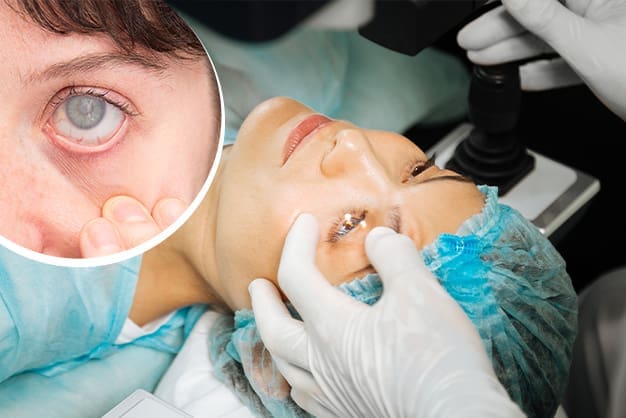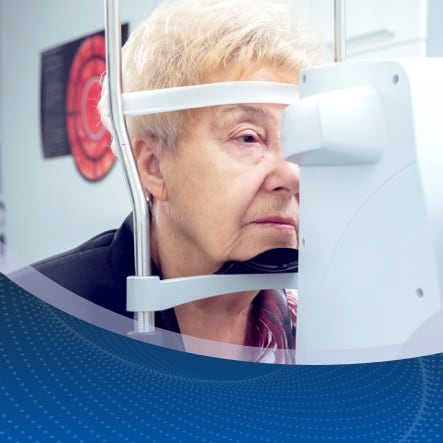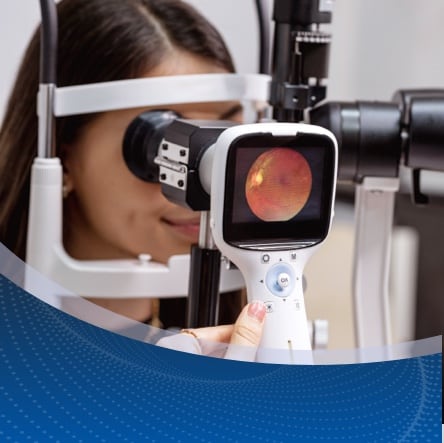Cataracts are a common eye condition that can develop with age, causing your vision to become cloudy and interfering with everyday life. If you do spot a cataract, the only way to remove it is through surgery. Could you have cataracts and not know it?
Early detection of cataracts is crucial for several reasons. If you catch them soon enough, you can get help before they make your vision much worse. Early detection means you have more treatment options besides surgery, like new glasses or changing some habits, which might slow down the cataracts’ growth.
Additionally, if you do need surgery later, it’s usually safer and more effective when the cataracts aren’t advanced. Keeping up with your regular eye exams is the best way to spot cataracts early, allowing you to take steps to protect your eyesight and quality of life. In this blog, Griffey Eye Care & Laser Center professionals discuss seven clear signs that it might be time to consider cataract surgery.
Table of Contents
Quick Cataracts Statistics
- Cataracts affect more than 20.5 million Americans age 40 and older.
- Approximately 6.1 million Americans have undergone cataract surgery.
- By age 80, over half of all Americans either have cataracts or have had cataract surgery.
- Cataract surgery is one of the most common and successful surgeries performed in the United States annually.
For more information, please refer to the CDC for comprehensive data and statistics on cataracts.
What Are the Signs You Need Cataract Surgery?
1. Blurred Vision
One of the most common signs that you may need cataract surgery is experiencing blurred vision. This can make everyday activities like reading, using a computer, or recognizing faces more challenging. As the cataract progresses, the blurriness often worsens. This symptom is among the most common signs you need cataract surgery.
2. Increased Sensitivity to Light
Sensitivity to light, or photophobia, is another indicator. You may find that bright sunlight, streetlights, or headlights from oncoming traffic are increasingly bothersome, causing discomfort or the need to squint.
3. Seeing Halos Around Lights
If you start seeing halos or bright circles around lights, particularly at night, this could be a symptom of cataracts. This visual disturbance can make night driving particularly hazardous.
4. Frequent Changes in Prescription Glasses
A sign your cataracts might be worsening is the frequent need to update your prescription glasses or contact lenses. If new prescriptions no longer improve your vision, surgery might be necessary.
5. Double Vision in a Single Eye
Double vision, or seeing two images of a single object, can be a disconcerting symptom of cataracts. When it occurs in just one eye, it’s often a strong indication that cataract development is progressing.
6. Fading or Yellowing of Colors
Cataracts can cause colors to appear faded, and over time, they may take on a yellow or brownish tint. This change in color perception can affect your ability to enjoy art, films, or nature’s vivid hues.
7. Difficulty Seeing at Night
If you find it increasingly hard to see in low-light conditions or at night, this might be due to cataracts. Night vision can deteriorate, and you might notice more glare or diminished brightness.
If you’re experiencing these symptoms, it might be time to consult an eye care professional to discuss the benefits of cataract surgery.
Cataract Self-Assessment: Do You Need Surgery?
Not sure if it’s time to consider cataract surgery? Ask yourself the following questions:
- Do I struggle to see clearly during everyday tasks, even with my most recent glasses or contacts?
- Am I frequently bothered by glare, halos around lights, or sensitivity to bright light?
- Do colors look less vibrant than they used to (are things appearing more faded or yellowish)?
- Have I experienced instances of double vision in one eye?
- Is driving at night becoming more difficult due to glare and poor visibility?
If you answered “Yes” to 3 or more of those questions, it may be time to consult an eye doctor.
Don’t ignore these warning signs, early evaluation can confirm if cataracts are the cause and whether surgery could help.
Think You Have Cataracts? Here’s What To Do Next
If you’re experiencing symptoms and are unsure whether you have cataracts, the first step is to schedule an eye exam with a professional, such as the specialists at Griffey Eye Care & Laser Center. During the eye exam, our specialist will conduct a series of tests to gather detailed information about your vision and eye health. These tests can include a visual acuity test, a slit-lamp examination, and a retinal exam.
Remember that cataracts develop gradually. Just because you have cataracts doesn’t mean you need surgery right away. At first, the changes in your vision are minor and might go unnoticed. However, when cataracts begin to affect your daily life, it’s time to discuss surgery with your eye doctor and be prepared with the right questions. This is also a great time to address post-treatment concerns, like potential blurry vision after cataract surgery.
Before surgery, you will choose an artificial lens called an intraocular lens (IOL). During the procedure, the doctor will remove and replace your natural lens with the intraocular lens.
If cataracts are detected during your eye exam, Griffey Eye Care & Laser Center offers several advanced treatment options. One of the most effective treatments is laser cataract surgery, a minimally invasive procedure that uses LenSx® laser technology to break up and remove the cloudy lens. Depending on your needs and preferences, other options may include changing your glasses prescription or implementing lifestyle changes to manage symptoms.
Additional Resources
- Cataract Surgery Recovery Time: Wondering what recovery from cataract surgery is like? Read our guide on cataract surgery recovery to know what to expect after the procedure.
- Does Medicare Cover Cataract Surgery? If you’re curious about insurance coverage for cataract surgery and related eye care, check out our explainer on Medicare coverage for cataract surgery.
- American Academy of Ophthalmology – Cataracts: For in-depth information from a trusted source, visit the AAO’s official page about cataracts, their impact, and treatment options.
Don’t Wait – Schedule Your Cataract Screening Today! Cataract symptoms won’t improve on their own. Early detection can give you more treatment options and better results.
Call us at 1-888-873-9348 or schedule an appointment online to consult with our cataract specialists. At Griffey Eye Care & Laser Center, we’re here to help you see clearly again!
**Please note that the suggestions provided in this blog are for general informational purposes only and may not be suitable for your specific insurance plan and cataract needs. It is important to consult a qualified healthcare professional for personalized advice and treatment.**













